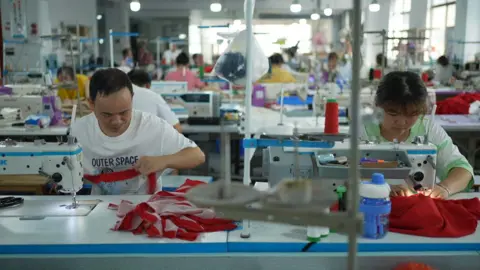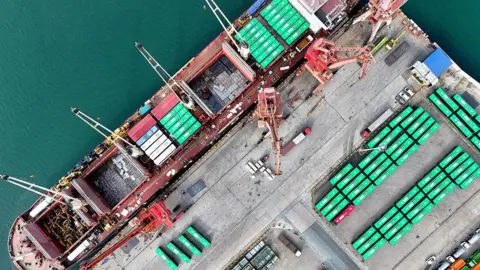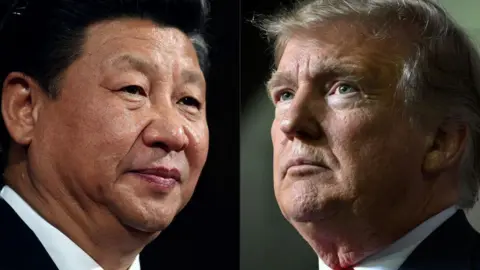 BBC
BBCChina’s finance ministry has introduced an 84% tariff on items imported from the US because it retaliates in opposition to new levies imposed by the White Home.
The hike in tariffs, from 34%, got here as US President Donald Trump’s 104% tariff on Chinese language items got here into power.
Beijing says the brand new fees will take impact from Thursday.
China has known as for the world to unite in opposition to Trump’s tariffs because the nation’s exporters reel from the crippling new levies.
“International unity can overcome commerce tyranny,” declared an editorial within the state-run newspaper China Day by day, noting Beijing’s collaborations with Japan, South Korea and different Asian economies.
A separate piece known as for the European Union to work with it to “uphold free commerce and multilateralism”.
Beijing “firmly opposes and can by no means settle for such hegemonic and bullying practices,” international ministry spokesperson Lin Jian instructed reporters on Wednesday.
The tariffs come at a troublesome time for China’s sluggish economic system: home consumption stays weak and exports are nonetheless a serious driver of progress.
The sweeping nature of Trump’s tariffs has additionally left Chinese language companies scrambling to regulate their provide chains – with most nations affected, corporations say it is laborious to discover a approach out of this uncertainty.
The tariffs will shrink “already razor-thin revenue margins”, mentioned the proprietor of a Chinese language enterprise that handles cross-border logistics for e-commerce, in addition to air and sea freight. He didn’t want to share his identify.
“Increased tariffs elevate prices for freight forwarders like us, in addition to for factories, corporations, and sellers. It simply means everybody earns much less.”
Any tariff upwards of 35% will wipe out all of the income that Chinese language companies make when exporting to the US or South East Asia, mentioned Dan Wang from the Eurasia Group consultancy.
“Development goes to be a lot decrease since exports contributed to twenty% to 50% of progress because the Covid pandemic,” she added.
The Chinese language authorities has not introduced retaliatory measures however Beijing is reportedly contemplating banning Hollywood movies and suspending fentanyl cooperation with the US, based on Chinese language blogger Liu Hong, who’s a senior editor at state-run Xinhua information.
However that might provide little consolation to corporations like Fuling, a agency that sells disposable tableware to US quick meals eating places like McDonald’s and Wendy’s, mentioned the extra tariffs will “considerably affect” its enterprise. It famous that almost two-thirds of the corporate’s income in 2023 and the primary half of final 12 months got here from the US.
To mitigate the affect of tariffs, Fuling, which is headquartered in China’s Zhejiang province, began a brand new manufacturing facility in Indonesia late final 12 months.
However Trump’s new tariffs have launched extra uncertainty for Chinese language exports from Indonesia are actually topic to a 32% levy, the corporate mentioned in a company submitting.
 Getty Photos
Getty PhotosIndonesia was hit together with a lot of the world in President Trump’s announcement of expansive tariffs last week, which he claimed would enable the US economic system to flourish.
However economists have warned of a US and world recession. The tariffs have additionally shaken world markets and drawn criticism from billionaire CEOs, together with Trump’s ally Elon Musk.
Trump’s import taxes embrace a ten% baseline tariff on virtually all international imports to the US, and better customized tariffs for what he calls the “worst offenders”. These embrace Cambodia (49%), Vietnam (46%) and Thailand (36%), creating economies which have benefited from sturdy exports.
After Beijing introduced tit-for-tat tariffs, Trump raised the levies on Chinese language imports, greater than doubling them to 104%.
The proprietor of the logistics agency instructed the BBC he’s holding out hope that China will be capable of negotiate away a few of these taxes: “Solely when a ultimate resolution is made can we plan our subsequent steps.”
Whereas China has left the door open for talks, Trump has not spoken to Chinese language chief Xi Jinping since returning to the White Home.
Such broad, sweeping tariffs will trigger extra hurt than good, the American Chamber of Commerce in China mentioned in a observe to its member corporations on Wednesday.
“This degree of upheaval is unprecedented, and it stays unclear how the present measures will profit shoppers in both nation or the broader economic system,” learn the observe signed by Chair Alvin Liu and President Michael Hart.
 Getty Photos
Getty PhotosSome analysts consider the levies will power China to restructure its economic system and rely closely on home consumption, which it has been struggling to boost.
In any other case, the tariffs is not going to be sustainable for China in the long run, Tim Waterer from brokerage KCM Commerce mentioned.
“The tariffs are geared toward suppressing China,” mentioned the supervisor of a Chinese language freight firm, who requested to stay nameless.
He added that most of the South East Asian nations which were hit with steep tariffs are “precisely the place many Chinese language companies have relocated”, akin to Vietnam and Cambodia.
The Tianjin-based firm plans to barter with a few of its American shoppers to share the burden of the tariffs. “Each case is totally different, however total, the affect has been fairly substantial,” he mentioned.
One other freight firm supervisor Wu Changchun, whose agency primarily operates on delivery routes between China and Cambodia, mentioned he’s already seeing a fall in freight quantity.
A number of building initiatives in Cambodia have additionally come to a halt after Trump’s tariffs announcement, he mentioned.
“If the tariffs had been at 10% or 20%, companies would possibly nonetheless be capable of soak up the price by optimising provide chains, slicing margins and sharing the burden. Commerce might nonetheless go on… [But at 104%] that is not one thing trade-offs can repair,” mentioned Mr Wu, a common supervisor at Maritima Maruba.
“That is full-on decoupling. Commerce would principally come to a standstill.”
Extra reporting by Annabelle Liang

